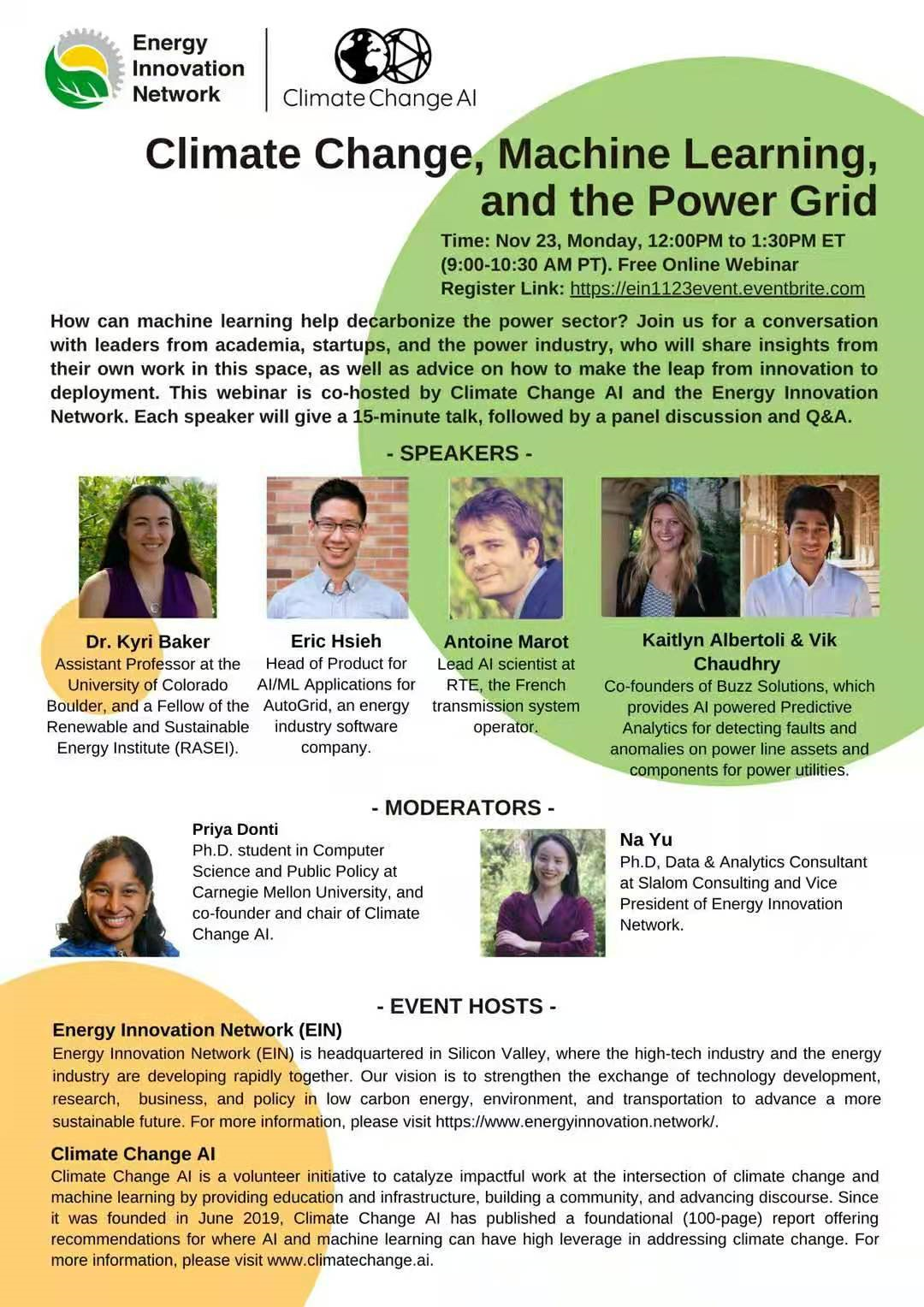电力行业如何通过人工智能减少碳排放量?能源创新网络携手Climate Change AI举办线上研讨会

电力行业是如何通过人工智能减碳排放量?能源创新网络(Energy Innovation Network)携手 Climate Change AI 将共同举办一个线上 Panel Discussion 进行深度探讨。
此次活动特别邀请了 5 位来自工业界和学术界的嘉宾:AutoGrid 的人工智能的产品 lead,Buzz Solution 的创始人,Coloroda 大学的助理教授, 以及法国电网公司的首席人工智能科学家。诚挚欢迎大家来参加!
本次活动时间:
太平洋时间 11 月 23 日,9:00-10:30am(北京时间 11 月 24 日,1:00-2:30am)
About this Event
SPEAKERS
Dr. Kyri Baker
Dr. Kyri Baker received her B.S., M.S., and Ph.D. in Electrical and Computer Engineering from Carnegie Mellon University in 2009, 2010, and 2014, respectively. From 2015 to 2017, she worked at the National Renewable Energy Laboratory. Since Fall 2017, she has been an Assistant Professor at the University of Colorado Boulder. Dr. Baker is a Fellow of the Renewable and Sustainable Energy Institute (RASEI). Her research focuses on renewable energy integration by changing the way the electric power grid operates. In particular, she develops computationally efficient optimization and learning algorithms for energy systems ranging from building-level assets to transmission grids.
Eric Hsieh
Eric Hsieh is the Head of Product for AI/ML Applications for AutoGrid, an energy industry software company. Previously working as a Sr. Machine Learning Engineer for AutoGrid, he built and deployed a Predictive Maintenance model at a Fortune 500 energy company that catches distribution outages with IoT data in realtime. Now, as the Head of Product, Eric aims to make the energy grid more efficient by productizing AI applications. He received his formal education in Evolutionary Biology from the University of Michigan at Ann Arbor, where he founded a biofuel startup that made energy from brewery wastewater. In his free time, Eric enjoys gardening and golfing.
Antoine Marot
Antoine Marot is the lead AI scientist at RTE, the French transmission system operator. He holds a double master’s degree in Engineering from Ecole Centrale Paris and Stanford University. After interning at Tesla Motors, he joined RTE R&D on the Apogee project 6 years ago, with the long-term goal of developing a personal assistant for control room operators with AI. Through collaboration with INRIA (the French AI research lab), he supervised several Ph.D. students on augmented power system simulators with AI, and on Human-Intelligent Machine interactions with a strong focus on interpretability. He recently co-authored several papers using AI for power systems and has given talks on the topic at various venues, including a keynote at the IJCNN AI conference. He advocates for a new "AI for power systems community" bringing together researchers from both fields to accelerate the application of AI. The “Learning to Run a Power Network” challenge running along NeurIPS 2020, the largest AI conference, is a strong step forward towards it.
Kaitlyn Albertoli & Vik Chaudhry
As the two co-founders of Buzz Solutions, Kaitlyn Albertoli and Vik Chaudhry met during their time at Stanford University and created Buzz Solutions from a launchpad course there in the spring of 2017. Jointly, the two bring a well-rounded and complimentary skillset to the table. Vik has a Master's degree from Stanford in Energy Engineering focusing on applications of Machine Learning and AI for Smart Grid technologies, Demand Response, and Energy Efficiency. He has several years of experience with AI/Machine Learning and Computer Vision, leading ML teams at Cisco Systems. Kaitlyn also graduated from Stanford with coursework in Economics and Finance. She has previous experience working in finance at J.P. Morgan and also ran a nonprofit in the Sustainable Food space. Each bringing unique skill sets to the table, Vik and Kaitlyn are passionate about bringing the digital transformation to a traditional industry with a burning need to modernize the aging grid infrastructure and to put an end to some of the mass disasters such as wildfires, forced shutdowns, and network failures as a result of failed infrastructure.
MODERATORS
Priya Donti
Priya Donti is a Ph.D. student in Computer Science and Public Policy at Carnegie Mellon University, and a U.S. Department of Energy Computational Science Graduate Fellow. She is also a co-founder and chair of Climate Change AI, an initiative to catalyze impactful work in climate change and machine learning. Her work lies at the intersection of machine learning, electric power systems, and climate change mitigation. Specifically, her research explores ways to incorporate domain knowledge (such as power system physics) into machine learning models.
Na Yu
Na Yu is a Data & Analytics Consultant at Slalom Consulting. She has 4 years’ experience in consulting in various industries, such as energy and healthcare. She is also currently the Vice President of Energy Innovation Network, a non-profit organization focusing on advancing sustainability in fields of technology, business, and policy, based in Silicon Valley. She completed her Ph.D. in Mechanical Engineering focusing on building energy management.
Event hosts
Energy Innovation Network (EIN)
Energy Innovation Network (EIN) is headquartered in Silicon Valley, where the high-tech industry and the energy industry are developing rapidly together. Our vision is to strengthen the exchange of technology development, research, business, and policy in low carbon energy, environment, and transportation to advance a more sustainable future.
Through event series, conferences, and special projects, EIN brings together industry professionals, experts, scholars, and business elites in all fields in energy, environment, and transportation to promote the common development and progress of the industry in the future through cross-border collaborations. For more information, please visit https://www.energyinnovation.network/.
Climate Change AI
Climate Change AI is a volunteer initiative to catalyze impactful work at the intersection of climate change and machine learning by providing education and infrastructure, building a community, and advancing discourse. Since it was founded in June 2019, Climate Change AI has published a foundational (100-page) report offering recommendations for where AI and machine learning can have high leverage in addressing climate change; organized conferences and events at top machine learning venues and the COP25; and led the creation of a global network of researchers, engineers, entrepreneurs, investors, policymakers, companies, and NGOs. For more information, please visit www.climatechange.ai.







